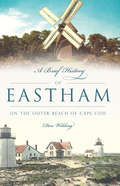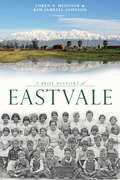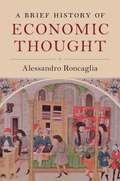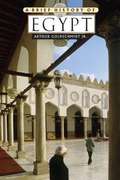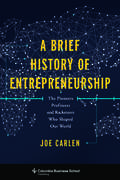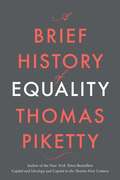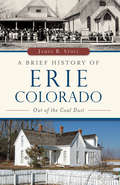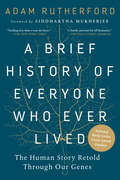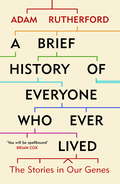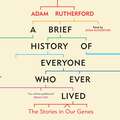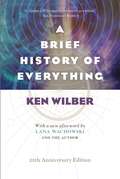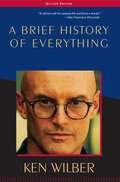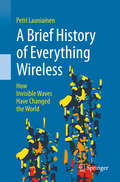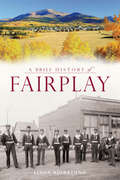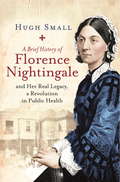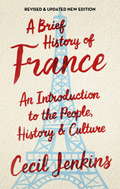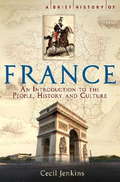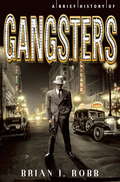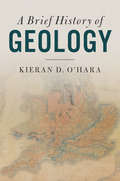- Table View
- List View
A Brief History of Eastham: On the Outer Beach of Cape Cod (Brief History)
by Don WildingFirst known as Nauset, Eastham once reached across the eastern half of Cape Cod from Bass River to the tip of what is now Provincetown. The area was home to the Nauset tribe for thousands of years before exploration by Champlain and the Pilgrims, and it is now known as the “Gateway to the Cape Cod National Seashore.” Whether it’s the U.S. Life-Saving Service and its shipwreck rescues, Cape Cod’s oldest windmill or tales of sea captains and rumrunners, Eastham is truly rich in history and tradition. Author Don Wilding wanders back in time through the Outer Cape’s back roads, sand dunes and solitary beaches to uncover Eastham’s fascinating past.
A Brief History of Eastvale (Brief History)
by Kim Jarrell Johnson Loren P. MeissnerThe vibrant and beloved community of Eastvale was once an agrarian paradise. Developed initially as ranchlands, this area tucked along the Santa Ana River was transformed by industrious farmers who produced alfalfa and other crops, raised poultry and eventually thrived as dairymen. Eastvale's latest agents of change, however, weren't cattlemen or farmers but real estate agents. Indeed, land developers saw the same potential in Eastvale as the initial ranchers did. Beginning in the 1990s, developers created charming homes and planned neighborhoods for former city dwellers eager to live in Riverside County. Despite the changes, the bucolic ambiance of the bygone era remains. Authors Loren P. Meissner and Kim Jarrell Johnson recount the dynamic changes, important people and exciting events that created Eastvale.
A Brief History of Economic Thought
by Alessandro RoncagliaThe evolution of economic thought can be traced back from its beginnings in classical antiquity up to the present day. In this book, Professor Alessandro Roncaglia offers a clear, concise and updated version of his award-winning The Wealth of Ideas, studying the development of economic thought through perspectives and debates on the economy and society over time. With chapters on prominent economic theorists, including William Petty, Karl Marx, and John Maynard Keynes, as well as on other important figures and key debates of each period, Roncaglia critically evaluates the foundations of the marginalist-neoclassical (scarcity-utility) approach in comparison to the Classical-Keynes approach. A comprehensive guide to the history of economic thought, this book will be of value not only to undergraduate and postgraduate students studying economic thought, but also to any readers desiring to study how economics has evolved up to the present day.
A Brief History of Egypt
by Arthur GoldschmidtThis reference for high school and up explores Egypt's broad political, economic, social, and cultural developments, from ancient times to the diverse cultural and political landscape of today. Complementing the narrative are sidebars with information on topics such as gods and goddesses of ancient Egypt, and political parties in the early part of the 20th century. Appendices offer a glossary, a list of basic facts, a chronology, and suggestions for further reading. Annotation ©2008 Book News, Inc., Portland, OR (booknews.com)
A Brief History of English Syntax
by Olga Fischer De Smet Hendrik Wurff Wim Van DerIn its 1500-year history, the English language has seen dramatic grammatical changes. This book offers a comprehensive and reader-friendly account of the major developments, including changes in word order, the noun phrase and verb phrase, changing relations between clausal constituents and the development of new subordinate constructions. The book puts forward possible explanations for change, drawing on the existing and most recent literature, and with reference to the major theoretical models. The authors use corpus evidence to investigate language-internal and language-external motivations for change, including the impact of language contact. The book is intended for students who have been introduced to the history of English and want to deepen their understanding of major grammatical changes, and for linguists in general with a historical interest. It will also be of value to literary scholars professionally engaged with older texts.
A Brief History of Entrepreneurship: The Pioneers, Profiteers, and Racketeers Who Shaped Our World (Columbia Business School Publishing)
by Joe CarlenA Brief History of Entrepreneurship charts how the pursuit of profit by private individuals has been a prime mover in revolutionizing civilization. Entrepreneurs often butt up against processes, technologies, social conventions, and even laws. So they circumvent, innovate, and violate to obtain what they want. This creative destruction has brought about overland and overseas trade, colonization, and a host of revolutionary technologies—from caffeinated beverages to the personal computer—that have transformed society.Consulting rich archival sources, including some that have never before been translated, Carlen maps the course of human history through nine episodes when entrepreneurship reshaped our world. Highlighting the most colorful characters of each era, he discusses Mesopotamian merchants' creation of the urban market economy; Phoenician merchant-sailors intercontinental trade, which came to connect Africa, Asia, and Europe; Chinese tea traders' invention of paper money; the colonization of the Americas; and the current "flattening" of the world's economic playing field. Yet the pursuit of profit hasn't always moved us forward. From slavery to organized crime, Carlen explores how entrepreneurship can sometimes work at the expense of others. He also discusses the new entrepreneurs who, through the nascent space tourism industry, are leading humanity to a multiplanetary future. By exploring all sides of this legacy, Carlen brings much-needed detail to the role of entrepreneurship in revolutionizing civilization.
A Brief History of Equality
by Thomas PikettyThe world’s leading economist of inequality presents a short but sweeping and surprisingly optimistic history of human progress toward equality despite crises, disasters, and backsliding. A perfect introduction to the ideas developed in his monumental earlier books. It’s easy to be pessimistic about inequality. We know it has increased dramatically in many parts of the world over the past two generations. No one has done more to reveal the problem than Thomas Piketty. Now, in this surprising and powerful new work, Piketty reminds us that the grand sweep of history gives us reasons to be optimistic. Over the centuries, he shows, we have been moving toward greater equality. Piketty guides us with elegance and concision through the great movements that have made the modern world for better and worse: the growth of capitalism, revolutions, imperialism, slavery, wars, and the building of the welfare state. It’s a history of violence and social struggle, punctuated by regression and disaster. But through it all, Piketty shows, human societies have moved fitfully toward a more just distribution of income and assets, a reduction of racial and gender inequalities, and greater access to health care, education, and the rights of citizenship. Our rough march forward is political and ideological, an endless fight against injustice. To keep moving, Piketty argues, we need to learn and commit to what works, to institutional, legal, social, fiscal, and educational systems that can make equality a lasting reality. At the same time, we need to resist historical amnesia and the temptations of cultural separatism and intellectual compartmentalization. At stake is the quality of life for billions of people. We know we can do better, Piketty concludes. The past shows us how. The future is up to us.
A Brief History of Erie, Colorado: Out Of The Coal Dust (Brief History)
by James B. StullFrom 1866 until 1979, Erie was one of the largest coal-producing towns in the nation. Numerous settlers contributed to building Old Town and making it one of the liveliest communities in northern Colorado. The Columbine Mine massacre in 1927 incited major changes to coal mining practices, inspiring unionization efforts nationally. The improved rights and working conditions that miners struggled to win benefit employees across America today. Emeritus Professor James B. Stull illuminates Erie's earliest pioneers, houses, schools and churches and the town's enduring evolution.
A Brief History of Everyone Who Ever Lived: The Human Story Retold Through Our Genes
by Siddhartha Mukherjee Adam RutherfordNational Book Critics Circle Award—2017 Nonfiction Finalist “Nothing less than a tour de force—a heady amalgam of science, history, a little bit of anthropology and plenty of nuanced, captivating storytelling.”—The New York Times Book Review, Editor’s Choice A National Geographic Best Book of 2017 In our unique genomes, every one of us carries the story of our species—births, deaths, disease, war, famine, migration, and a lot of sex. But those stories have always been locked away—until now. Who are our ancestors? Where did they come from? Geneticists have suddenly become historians, and the hard evidence in our DNA has blown the lid off what we thought we knew. Acclaimed science writer Adam Rutherford explains exactly how genomics is completely rewriting the human story—from 100,000 years ago to the present.
A Brief History of Everyone Who Ever Lived: The Stories in Our Genes
by Adam Rutherford'A brilliant, authoritative, surprising, captivating introduction to human genetics. You'll be spellbound' Brian CoxThis is a story about you. It is the history of who you are and how you came to be. It is unique to you, as it is to each of the 100 billion modern humans who have ever drawn breath. But it is also our collective story, because in every one of our genomes we each carry the history of our species - births, deaths, disease, war, famine, migration and a lot of sex. In this captivating journey through the expanding landscape of genetics, Adam Rutherford reveals what our genes now tell us about human history, and what history can now tell us about our genes. From Neanderthals to murder, from redheads to race, dead kings to plague, evolution to epigenetics, this is a demystifying and illuminating new portrait of who we are and how we came to be.***'A thoroughly entertaining history of Homo sapiens and its DNA in a manner that displays popular science writing at its best' Observer 'Magisterial, informative and delightful' Peter Frankopan'An extraordinary adventure...From the Neanderthals to the Vikings, from the Queen of Sheba to Richard III, Rutherford goes in search of our ancestors, tracing the genetic clues deep into the past' Alice Roberts
A Brief History of Everyone Who Ever Lived: The Stories in Our Genes
by Adam Rutherford'A brilliant, authoritative, surprising, captivating introduction to human genetics. You'll be spellbound' Brian CoxThis is a story about you. It is the history of who you are and how you came to be. It is unique to you, as it is to each of the 100 billion modern humans who have ever drawn breath. But it is also our collective story, because in every one of our genomes we each carry the history of our species - births, deaths, disease, war, famine, migration and a lot of sex. In this captivating journey through the expanding landscape of genetics, Adam Rutherford reveals what our genes now tell us about human history, and what history can now tell us about our genes. From Neanderthals to murder, from redheads to race, dead kings to plague, evolution to epigenetics, this is a demystifying and illuminating new portrait of who we are and how we came to be.***'A thoroughly entertaining history of Homo sapiens and its DNA in a manner that displays popular science writing at its best' Observer 'Magisterial, informative and delightful' Peter Frankopan'An extraordinary adventure...From the Neanderthals to the Vikings, from the Queen of Sheba to Richard III, Rutherford goes in search of our ancestors, tracing the genetic clues deep into the past' Alice Roberts
A Brief History of Everything
by Ken Wilber"A Brief History of Everything is an altogether friendly and accessible account of men and women's place in a universe of sex, soul, and spirit, written by an author of whom New York Times reporter Tony Schwartz says: "No one has described the path to wisdom better than Ken Wilber."
A Brief History of Everything (2nd edition)
by Ken WilberA Brief History of Everything sheds a very original light, not just on the cosmic questions in our lives, but on dozens of confusing and unsettling issues of our times--the changing roles of men and women; the continuing destruction of the environment; diversity and multiculturalism; repressed memory and childhood sexual abuse; and the role of the Internet in the information age--among many others.
A Brief History of Everything Wireless: How Invisible Waves Have Changed the World
by Petri LauniainenSince the discovery of electromagnetic waves less than 150 years ago, the application of wireless communications technology has not only revolutionized our daily lives, but also fundamentally changed the course of world history.A Brief History of Everything Wireless charts the fascinating story of wireless communications. The book leads the reader on an intriguing journey of personal triumphs and stinging defeats, relating the prominent events, individuals and companies involved in each progressive leap in technology, with a particular focus on the phenomenal impact of each new invention on society. Beginning at the early days of spark-gap transmitters, this tale touches on the emergence of radio and television broadcasting, as well as radio navigation and radar, before moving on to the rise of satellite, near-field and light-based communications. Finally, the development of wireless home networks and the explosive growth of modern cellular technologies are revealed, complete with a captivating account of their corresponding company histories and behind-the-scenes battles over standards.For those wishing to peek behind the magic curtain of friendly user interfaces and clever engineering, and delve further into various processes underlying the ubiquitous technology we depend upon yet take for granted, the book also contains special “TechTalk” chapters that explain the theoretical basics in an intuitive way.
A Brief History of Fairplay (Brief History)
by Linda BjorklundExplore Fairplay from the beginning with local historian Linda Bjorklund as she traces the town's story through Spanish settlers, early American government, Union-Confederate tensions and modern development. Even though Fairplay's remarkable gold and silver boom was reduced to ash overnight in 1873, a strong community overcame history's challenges and preserved its treasures. From the popular annual Burro Days to the Way of Life Museum, Fairplay gives folks a chance to celebrate and relive its rich mining history through festivities and time-capsule buildings such as the general store, drugstore, bank, Summer Brewery and Summer Saloon.
A Brief History of Fascist Lies
by Federico FinchelsteinIn this short companion to his book From Fascism to Populism in History, world-renowned historian Federico Finchelstein explains why fascists regarded simple and often hateful lies as truth, and why so many of their followers believed the falsehoods. Throughout the history of the twentieth century, many supporters of fascist ideologies regarded political lies as truth incarnated in their leader. From Hitler to Mussolini, fascist leaders capitalized on lies as the base of their power and popular sovereignty.This history continues in the present, when lies again seem to increasingly replace empirical truth. Now that actual news is presented as "fake news" and false news becomes government policy, A Brief History of Fascist Lies urges us to remember that the current talk of "post-truth" has a long political and intellectual lineage that we cannot ignore.
A Brief History of Fascist Lies
by Federico Finchelstein"There is no better book on fascism's complex and vexed relationship with truth."—Jason Stanley, author of How Fascism Works: The Politics of Us and Them In this short companion to his book From Fascism to Populism in History, world-renowned historian Federico Finchelstein explains why fascists regarded simple and often hateful lies as truth, and why so many of their followers believed the falsehoods. Throughout the history of the twentieth century, many supporters of fascist ideologies regarded political lies as truth incarnated in their leader. From Hitler to Mussolini, fascist leaders capitalized on lies as the base of their power and popular sovereignty. This history continues in the present, when lies again seem to increasingly replace empirical truth. Now that actual news is presented as "fake news" and false news becomes government policy, A Brief History of Fascist Lies urges us to remember that the current talk of "post-truth" has a long political and intellectual lineage that we cannot ignore.
A Brief History of Florence Nightingale: and Her Real Legacy, a Revolution in Public Health
by Hugh SmallFlorence Nightingale (1820-1910) is best known as a reformer of hospital nursing during and after the Crimean War, but many feel that her nursing reputation has been overstated. A Brief History of Florence Nightingale tells the story of the sanitary disaster in her wartime hospital and why the government covered it up against her wishes. After the war she worked to put the lessons of the tragedy to good use to reduce the very high mortality from epidemic disease in the civilian population at home. She did this by persuading Parliament in 1872 to pass laws which required landlords to improve sanitation in working-class homes, and to give local authorities rather than central government the power to enforce the laws. Life expectancy increased dramatically as a result, and it was this peacetime civilian public health reform rather than her wartime hospital nursing record that established Nightingale's reputation in her lifetime. After her death the wartime image became popular again as a means of recruiting hospital nurses and her other achievements were almost forgotten. Today, with nursing's new emphasis on 'primary' care and prevention outside hospitals, Nightingale's focus on public health achievements makes her an increasingly relevant figure.
A Brief History of Florence Nightingale: and Her Real Legacy, a Revolution in Public Health (Brief Histories)
by Mr Hugh SmallPraise for Small's earlier work on Nightingale: 'Hugh Small, in a masterly piece of historical detective work, convincingly demonstrates what all previous historians and biographers have missed . . . This is a compelling psychological portrait of a very eminent (and complex) Victorian.' James Le Fanu, Daily TelegraphFlorence Nightingale (1820-1910) is best known as a reformer of hospital nursing during and after the Crimean War, but many feel that her nursing reputation has been overstated. A Brief History of Florence Nightingale tells the story of the sanitary disaster in her wartime hospital and why the government covered it up against her wishes. After the war she worked to put the lessons of the tragedy to good use to reduce the very high mortality from epidemic disease in the civilian population at home. She did this by persuading Parliament in 1872 to pass laws which required landlords to improve sanitation in working-class homes, and to give local authorities rather than central government the power to enforce the laws. Life expectancy increased dramatically as a result, and it was this peacetime civilian public health reform rather than her wartime hospital nursing record that established Nightingale's reputation in her lifetime. After her death the wartime image became popular again as a means of recruiting hospital nurses and her other achievements were almost forgotten. Today, with nursing's new emphasis on 'primary' care and prevention outside hospitals, Nightingale's focus on public health achievements makes her an increasingly relevant figure.
A Brief History of France, Revised and Updated (Brief Histories)
by Cecil JenkinsWhen we think of France, we tend think of fine food and wine, the elegant boulevards of Paris or the chic beaches of St Tropez. Yet, as the largest country in Europe, France is home to extraordinary diversity. The idea of 'Frenchness' emerged through 2,000 years of history and it is this riveting story, from the Roman conquest of Gaul to the present day, that Cecil Jenkins tells: of the forging of this great nation through its significant people and events and and its fascinating culture. As he unfolds this narrative, Jenkins shows why the French began to see themselves as so different from the rest of Europe, but also why, today, the French face the same problems with regard to identity as so many other European nations.
A Brief History of France, Revised and Updated: An Introduction To The People, History And Culture (Brief Histories )
by Cecil JenkinsWhen we think of France we often evoke images of fine food and wine, the elegant boulevards of Paris, the chic beaches of St Tropez. Yet, as the largest country in Europe, it is a place of huge diversity. The idea of 'Frenchness' emerged from over 2000 years of history and it is a riveting story from Roman conquest to the present day. Cecil Jenkins tells the story of the formation of this nation through its people, great events and culture. Through this narrative he charts why the French began to see themselves as so different from the rest of Europe and why, today, they face the same problems of identity as many other nations.
A Brief History of France: An Introduction To The People, History And Culture (Brief Histories Ser.)
by Cecil JenkinsWhen we think of France, we tend think of fine food and wine, the elegant boulevards of Paris or the chic beaches of St Tropez. Yet, as the largest country in Europe, France is home to extraordinary diversity. The idea of 'Frenchness' emerged through 2,000 years of history and it is this riveting story, from the Roman conquest of Gaul to the present day, that Cecil Jenkins tells: of the forging of this great nation through its significant people and events and and its fascinating culture. As he unfolds this narrative, Jenkins shows why the French began to see themselves as so different from the rest of Europe, but also why, today, the French face the same problems with regard to identity as so many other European nations.
A Brief History of Gangsters (Brief Histories)
by Brian RobbThe romanticised American gangster of the Prohibition era has proved an enduringly popular figure. Even today, names like Al Capone and Lucky Luciano still resonate. Robb explores the histories of key figures, from gangs in the Old West, through Prohibition and the Great Depression, to the likes of John Gotti and Frank Lucas in the 1970s and 1980s. He also looks at the gangster in popular culture, in hit TV series such as Boardwalk Empire. Although the focus is strongly on the archetypal American gangster, Robb also examines gangsters around the world, including the infamous Kray twins in London, French crime kingpin Jacques Mesrine, the Mafia Dons of Sicily, and the rise of notorious Serbian and Albanian gangs. Infamous Australian outlaw Ned Kelly makes an appearance, as does Colombian drug lord Pablo Escobar, while other sections provide details of the Chinese Triads and the Yakuza in Japan. Robb also explores the gangster in popular culture, especially in film and television. Recent hit TV series such as The Sopranos and Boardwalk Empire and blockbuster movies like Public Enemies and Gangster Squad show that the gangster is here to stay.
A Brief History of Gangsters (Brief History)
by Brian J. RobbThe romanticised American gangster of the Prohibition era has proved an enduringly popular figure. Even today, names like Al Capone and Lucky Luciano still resonate. <P><P>Robb explores the histories of key figures, from gangs in the Old West, through Prohibition and the Great Depression, to the likes of John Gotti and Frank Lucas in the 1970s and 1980s. He also looks at the gangster in popular culture, in hit TV series such as Boardwalk Empire. <P>Although the focus is strongly on the archetypal American gangster, Robb also examines gangsters around the world, including the infamous Kray twins in London, French crime kingpin Jacques Mesrine, the Mafia Dons of Sicily, and the rise of notorious Serbian and Albanian gangs. Infamous Australian outlaw Ned Kelly makes an appearance, as does Colombian drug lord Pablo Escobar, while other sections provide details of the Chinese Triads and the Yakuza in Japan. Robb also explores the gangster in popular culture, especially in film and television.
A Brief History of Geology
by Kieran D. O’HaraGeology as a science has a fascinating and controversial history. <P><P>Kieran D. O'Hara's book provides a brief and accessible account of the major events in the history of geology over the last two hundred years, from early theories of Earth structure during the Reformation, through major controversies over the age of the Earth during the Industrial Revolution, to the more recent twentieth-century development of plate tectonic theory, and on to current ideas concerning the Anthropocene. <P>Most chapters include a short 'text box' providing more technical and detailed elaborations on selected topics. The book also includes a history of the geology of the Moon, a topic not normally included in books on the history of geology. The book will appeal to students of Earth science, researchers in geology who wish to learn more about the history of their subject, and general readers interested in the history of science. <P> Places geology in a wider context of the history of science in general, <P> Sixty figures explain historically important diagrams, <P> Includes a history of the geology of the Moon, which is not normally included in books on the history of geology.
